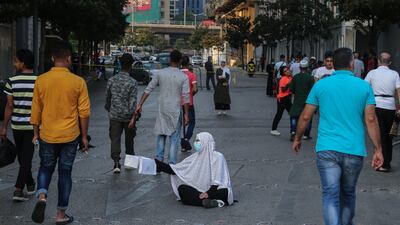More than four million people in Lebanon are at risk of losing access to clean water within weeks as cash-strapped authorities struggle to keep the infrastructure functioning, Unicef said on Friday.
The Lebanese state is finding it difficult to provide residents with basic necessities including fuel, electricity and now, potentially, water – the latest sign of the public sector’s collapse amid an economic crisis.
“Lebanon’s precious public water system is on life support and could collapse at any moment," said Yukie Mokuo, Unicef’s representative in Lebanon.
“A loss of access to the public water supply could force households to make extremely difficult decisions regarding their basic water, sanitation and hygiene needs.”
Public water utility providers can no longer afford to repair infrastructure after the maintenance costs of water pumps soared because of inflation.
The imported spare parts are priced in dollars, which are scarce, while the Lebanese pound continues to lose value.
Unicef estimates that 71 per cent of people in Lebanon, including one million refugees, risk losing access to water "in the next four to six weeks".
Decaying infrastructure, increasing fuel costs and power failures will cause public water pumps to run dry and the price of water to soar as the private sector fills the gap, the UN agency said.
Water costs could climb by 200 per cent a month should the public sector fail to meet the needs of residents, a cost that will be “too much to bear” for Lebanon’s poorest.
Since the onset of a severe economic crisis in late 2019, more than half of the Lebanese population has been pushed below the poverty line.
At the same time, the price of bottled water has doubled and the prices charged by private sector water suppliers have increased by 35 per cent.
Electricity cuts off for as much as 22 hours in a day and shortages of essential imported goods such as medicine are increasingly frequent, widening the gap between the country’s richest and poorest and pushing young people to emigrate.
The power failures also affect the water system because they interrupt the treatment, pumping, and distribution of water.
Women and girls would be particularly at risk because a lack of water may jeopardise “their personal hygiene, protection and dignity without access to safe sanitation”, Ms Mokuo said.
Unicef estimates that it will need $40 million a year to keep providing water to four million people across the country.
"Unless urgent action is taken, hospitals, schools and essential public facilities will be unable to function and over four million people will be forced to resort to unsafe and costly sources of water," she said.


